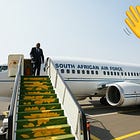One screen, Two Movies
How the Twatterbaas exposé revealed more than a Twitter troll, it exposed groups speaking in parallel monologues.
Scott Adams famously said we’re watching the same screen, but two different movies. It’s a pithy and useful way to describe how people can witness the same event, say, a political speech or a breaking news story and interpret it in diametrically opposed ways, depending on their priors.
But in South Africa, I’m beginning to think that some have gone one step further. People are not watching one screen anymore. People are sitting in two completely different theatres, each with its own audience, projector, scriptwriter, and sound effects team.
The Overton Window
The Overton window refers to the range of ideas and policies considered acceptable or mainstream in public discourse at a given time. It shifts over time as social norms evolve, defining what can be debated, endorsed, or even spoken aloud without provoking widespread backlash.
The illusion of shared national discourse, of a single Overton window within which ideas move in and out of public acceptability, is fast becoming a thing of the past. In its place in my view we now have two (arguably even a plurality of) Overton windows, each confident in its moral compass and dismissive of the other as either naïve or malign.
Twatterbaas
This fracture has seldom been as stark as in the recent case of the Twatterbaas exposé by News24, a story that, while narrow in scope, serves as a perfect prism through which to view our fractured civic imagination.
On the surface, the facts are straightforward. Twatterbaas is a pseudonymous Twitter account known for sharing video clips of Julius Malema, Andile Mxgitama and co and posting the odd inflammatory commentary, with a sometimes racist and ugly tone toward black South Africans. News24 conducted an investigation, unmasked the individual behind the account, and published their findings under the banner of public interest. Cue outrage from two entirely different quarters.
In one theatre, the crowd applauded. News24 had bravely exposed a racist coward hiding behind anonymity. Public accountability had triumphed. The Fourth Estate had done its job.
In the other theatre, gasps and boos echoed through the seats. This wasn’t journalism, it was ideological retribution masquerading as news. What about the thousands of equally vile, anti-white accounts? Why this one, and why now?
It is worth pausing here to reflect on how we arrived at this place where public discourse is so brittle, and trust in traditional institutions so strained, that even basic journalistic acts are interpreted as tribal warfare. In part, this is the downstream effect of digital public squares shaped by algorithms. The online environment encourages moral absolutism, immediate judgment, and group reinforcement rather than sober analysis. As such, even a defensible editorial decision becomes radioactive once it is filtered through the lens of factional identity. And this, more than anything, explains why so few people today change their minds: the cost of epistemic humility has become greater than the reward of truth.
The disconnect was immediate and total. There was no real debate but only tribal reaffirmation. Each side spoke past the other (read Frederik van Dyk’s excellent piece on this here), armed with moral certainty and unbothered by nuance. A perfect example, if ever one were needed, of two realities coexisting with very little shared ground.
And yet as a twist in this Twitter tale it’s entirely possible that both sides are right, and both are wrong.
News24
Let’s start with News24 and its defenders. Their argument is not without merit (this statement will undoubtedly anger many of my readers). If an account is partaking in public discourse regardless of whether it’s racist or not, and those opinions reach figures like Elon Musk, there’s a legitimate argument for unmasking the person behind it, particularly if that person holds influence or visibility. Speech has consequences. Something both sides in this debate would agree on, the one just views the consequences as detrimental and the other as shining the light on South Africa’s political realities.
But here’s the real crux of the matter: selective outrage erodes the moral authority of the messenger. News24, like many mainstream outlets, insists on the mantle of objectivity, yet frequently practices a form of journalism that is selective in its curiosity and conspicuously silent when the ideological tables are turned. Investigative resources are finite, yes, but the absence of symmetry over time begins to look less like triage of resources and more like bias. And once the audience begins to believe that the media referee is playing favourites, the legitimacy of the game collapses altogether.
Where the argument falters is in its selectivity. News24’s track record on these issues is... let’s say, uneven. For years, the South African Twittersphere has hosted a variety of accounts, anonymous or not, that peddle grotesque anti-white rhetoric, some openly fantasising about racial revenge or economic erasure. These accounts seldom feature in investigative exposés. Why? Is it a question of scale, audience, editorial policy or something else with a more ideological basis?
This is where the critics of the exposé strike a valid chord. Journalism loses its integrity when it becomes activism in a trench coat. The selective editorial outrage undermines trust in media institutions that already sit precariously in the public imagination with the democratisation of information. A free press is essential to democracy, but it or more specifically one of its biggest actors, News24, must be perceived as fair as well.
At the same time, the defenders of Twatterbaas make their own category error. There is no inalienable right to anonymity in public discourse. If one chooses to participate in the marketplace of ideas one cannot be shocked when others come looking for the hand that lit the fuse. Anonymity is a choice, not an entitlement, and the public’s interest in who says what, and why, is a natural outgrowth of digital citizenship.
It’s also important not to romanticise the idea of anonymous speech as inherently noble. While anonymity has historically served as a refuge for whistleblowers, dissidents, and vulnerable truth-tellers, it is not a right to be self proclaimed and respected simply because.
Two Movies
Watching the reactions unfold, it’s clear to me that people live in completely different worlds. In one, News24’s exposé is laughable not because doxxing is always wrong, but because the justification for it rings hollow. Twatterbaas’s tweet about black population growth, for example, was labelled “disinformation” by News24, even though the graph he used came from News24 itself. The irony did not go unnoticed. Public figures aligned with the online right were quick to pounce, not to defend the racism, which they largely ignored or downplayed, but to point out the absurdity, inconsistency, and what they see as ideological hypocrisy.
To them, Twatterbaas’s greatest sin wasn’t his tone but his success in drawing international attention to serious, real, and often under-reported problems in South Africa: farm murders, race-based policy, and institutional decay. That his commentary came wrapped in offensive packaging was, in this frame, a regrettable by-product, secondary to the core truth he was attempting to convey. They saw the exposé not as a moral act of public interest journalism, but as a message: don't challenge the dominant narrative too effectively, or we will find you.
In the other theatre, News24’s defenders see a different world entirely. They focus on Twatterbaas’s rhetoric, the racial generalisations and the dehumanising tone and argue that his reach amplified harm on a global scale. To them, the fact that high-profile figures like Elon Musk interacted with or echoed themes from the account only underscores the urgency of unmasking him. But in doing so, many of these same voices conveniently sidestep the real grievances and facts Twatterbaas highlighted grim, difficult realities that South Africa must confront. They championed the exposure of the messenger while refusing to engage seriously with the message.
And that’s the point. This episode isn’t just about two opposing opinions. It’s about two completely different worldviews operating with different facts, different standards, and different senses of justice. There is no shared frame of reference. And that is dangerous. People have to be able to talk to each other even when they disagree.
Conclusion
In this sense, the Twatterbaas affair reveals something more profound than just the quirks of cancel culture or the bias of the media. It highlights our country’s inability to conduct good-faith disagreement in a shared conceptual space. The digital town square has become a hall of mirrors, and we all see only what we expect to see.
Perhaps this is the real tragedy: not that there was an exposé, or that it provoked controversy, but that we no longer know how to disagree meaningfully. We assume bad faith, project ulterior motives, many times justifiably so. But this leads to a retreat into ideological bunkers. We do not debate, we perform for our own side. We do not critique, we cancel. And in doing so, we hollow out the very idea of a common civic life.
So no, I no longer think there is an Overton window in South Africa. There are two. And until we recognise that, and reckon with the discomfort of others inhabiting moral universes we find incoherent or distasteful, we’ll keep missing each other in the dark, hurling barbs across a chasm that keeps widening with every headline.
More articles:
If you found this piece worthwhile, feel free to share it with someone who might appreciate it.
To get future essays delivered directly to your inbox, you can subscribe here:
I welcome thoughtful conversation—feel free to reach out on LinkedIn or follow along on Twitter.






